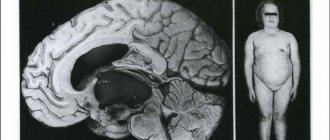Exploding head syndrome is a rare, unusual sleep disorder that has been described in considerable detail in the medical literature. The pathology was first described by the American physician Silas Ware Mitchell in 1876, when he examined two men who suffered from loud bells in their sleep or gun shots that woke them up.
This is actually not as rare a condition as it might seem. Bill Sharpless, an assistant professor of psychology at the University of Washington, conducted a survey of 211 college students and found that approximately 18% of respondents experienced this condition.
Detailed description of the syndrome
Exploding head syndrome was first described in detail by Silas Mitchell in 1876. But in the International Classification of Sleep Problems, this type of parasomnia appeared only at the beginning of the 21st century. Until this point, mention of the syndrome could only be found in special medical reference books.
Until now, the nature of the lesion has not been fully studied. There are a lot of unfounded guesses (for example, quantum consciousness), but along with them, scientists have been able to present a common-sense explanation for this form of parasomnia.
Relax and calm down
What do most of us do before bed? Hanging out on social networks, watching TV or a movie, playing computer and phone games? It’s unlikely that anything listed will help you relax and get ready for a good night’s sleep. In order to fall asleep quickly, you need to calm the nervous system and make it work more slowly. Create your own rituals: this could be taking a bath, reading a book (paper, not electronic), playing a board game or doing a puzzle with your family, getting a massage, meditating, or doing breathing exercises.
Manifestation of violation
As already mentioned, attacks of exploding head syndrome occur when falling asleep or waking up, as well as during night rest. The paroxysmal state may look like hallucinations, for example, the sounds of a strong wind, a loud explosion, during which the patient feels as if his head is being torn into pieces. Along with unpleasant noise, bright flashes may appear in front of your eyes.
Awakening during the syndrome occurs against the background of a short panic attack, which disappears after a couple of seconds. It is important to remember that only in some cases such attacks lead to headache pain. Many doctors believe that the pain associated with exploding head syndrome occurs due to psychological disorders.
This paroxysmal state may occur only once during a night's rest, or may continue with a number of attacks. Observation of a patient who is bothered by such a disorder has shown that the lesion can manifest itself once a week or a month. But in patients with an acute form, attacks are repeated every day.
Most often, the symptoms of nocturnal flashes of an exploding head are similar to stroke attacks or cerebral hemorrhage, but a full examination by a doctor does not reveal such problems.
Reduce the influence of gadgets
To maintain circadian rhythms, wise nature has provided a special mechanism. During daylight hours, special hormones are produced that allow us to feel alert and active. In the evening, when sunlight dissipates, melatonin comes into play. It is he who ensures falling asleep and staying asleep.
Blue light from cell phone, tablet and computer screens has been shown to have an effect similar to sunlight and reduce melatonin production. This prevents a person from falling asleep and leads to insomnia. For quality sleep, it is recommended to turn off devices for at least 1.5 hours.
If you cannot forget about your computer or phone due to circumstances, there are 2 options that will save your sleep:
- Spectacle lenses with a special optical coating that protects against blue light;
- Applications for smartphones and computers that filter the light spectrum of screens depending on the time of day.
Features of the disease
Exploding head attacks are not well understood, but there are many theories about their occurrence. Observation of a sleeping patient helped put forward the theory that the syndrome is due to disturbances in the functioning of the brain. This form of parasomnia appears as a result of disruption of the natural processes of excitation and inhibition that take place in the network formation.
While falling asleep, when the patient has not yet completely entered the sleep state, individual parts of the brain turn off one by one. Gradually, the shutdown of auditory and motor processes, as well as visual neurons, begins.
Also, flashes and loud sounds in the head can appear due to the fact that the auditory neurons, instead of shutting down, come to a working state. This is what can provoke unpleasant explosions in the head and visual hallucinations.
In addition, people suffering from this lesion have delays in response in the reticular formation (the area of the brain that is responsible for basic reflexes and activation of the cerebral cortex). At this time, alpha waves sent by the brain are significantly suppressed, helping a person to transition normally into a state of sleep.
Mechanism of noise
With VSD, tinnitus may appear due to hypoxia from compression of blood vessels and insufficient oxygen supply to brain cells. The mechanism for the occurrence of noise in the head may be damage to the inner ear. The ear consists of outer, middle and inner sections. The outer part is the auricle, which picks up the signal. The middle section receives this signal. The internal section, protected by the eardrum, has a cochlea, which is covered with tiny hairs. The inner ear also performs vestibular functions. It converts sound vibrations into impulses that enter the brain. When the hair cells of the cochlea are damaged, hearing loss occurs. Tinnitus appears and sometimes the ears become blocked.
Main reasons
Common causes of this form of parasomnia include:
- mild seizures that spread throughout the temporal lobe of the brain;
- severe disturbances in the structure of the middle ear;
- emotional depression, depression;
- lack of sleep (complete absence);
- hearing impairment;
- stopping taking tranquilizers;
- stopping benzodiazepines;
- severe physical activity;
- difficulties in the functioning of the nervous system;
- other sleep problems;
- regular use of alcoholic beverages or drugs;
- mental problems;
- chronic diseases of internal organs.
Women are more prone to exploding head syndrome.
It was previously believed that the syndrome appears predominantly in older people, but according to research conducted back in 2014 at the University of Washington, it was found that the disorder is more common in young people. In a survey of university students, 18 percent of them showed signs of impairment.
Follow the regime
Few people adhere to a constant regime of falling asleep and waking up: on weekends we like to sleep longer and watch our favorite TV series late in the evening. It has been proven that such a routine has an effect on the body similar to acclimatization. As a result, quality night sleep disappears, the nervous system is exhausted, a person needs more and more time to fall asleep, and eventually insomnia sets in.
Try to go to bed and wake up at the same time every day, getting enough sleep. After a couple of weeks, you will notice that falling asleep occurs much faster, and morning awakenings have become much easier.
General clinical picture
Audible and visual hallucinations pass without attacks of pain. Waking up from sudden sounds is accompanied by a feeling of fear, as well as sleep paralysis.
The main symptoms of exploding head syndrome are:
- Sounds of a strong explosion that seem to occur in the head and tear it into small pieces. Such sounds also include breaking strings, a bursting ball, the sounds of screaming, shooting and knocking.
- Sudden convulsions.
- The appearance of a short panic attack upon awakening.
- Night flashes in exploding head syndrome.
The attack of an exploding head is transient, lasting only a few seconds. If parasomnia occurs due to severe stress or mental tension, then experts advise the patient to simply have a good rest. After relaxation, in most cases, the sounds of exploding head syndrome go away immediately.
Consequences
Once faced with sleep paralysis and hearing ominous voices in the head, a person begins to experience severe anxiety about falling asleep. The quality of his sleep deteriorates significantly: insomnia sets in, awakenings occur too frequently, and sleep becomes shallow. This, in turn, paints the following picture.
- The person does not get enough sleep. He becomes distracted, depressed, cannot concentrate, and his memory deteriorates.
- Often such people become withdrawn and irritable. If they have no one to share the problem with or are afraid to talk about it, the situation gets worse. In some cases, aggression may occur.
- The patient's performance is significantly reduced. Sometimes even doing easy things becomes almost impossible.
- The person is afraid of the consequences. To those who do not know what is happening to them, voices in their heads when falling asleep seem to be some kind of paranormal phenomenon or a sign of approaching madness.
- All of the above consequences can lead to the fact that a person begins to avoid any contact with other people, stops leaving the house and falls into deep depression.
Definition of disease
To identify the problem, it is not at all necessary to conduct lengthy examinations. A neurologist or somnologist can quickly determine the disease after collecting an anamnesis and talking with the patient.
If you have severe difficulty sleeping, your doctor may prescribe a test such as polysomnography. Polysomnography examines in detail brain waves, heart rate and breathing during sleep. Also, during the examination, the doctor notes all movements of the limbs.
Polysomnography can help establish the connection between auditory hallucinations in the head during sleep and possible other difficulties. In some cases, the disease is accompanied by severe pain. It is very important to carry out a differential diagnosis of all signs that may indicate another source of headache.
symptoms in adults
Treatment of this disease consists only of relieving unpleasant sensations, since in many countries it is not even considered a disease, referring to the manifestation of other pathologies. This condition is also called neurocirculatory dysfunction. Quite often, when teenage girls complain of shortness of breath, weakness, dizziness, decreased performance and throbbing pain, doctors diagnose “vegetative-vascular dystonia.”
Providing assistance to the patient
Exploding head syndrome has recently appeared in medicine. There is no specific treatment method yet. The most common treatment for exploding head syndrome is medication. The doctor prescribes the following medications to patients:
- medicinal soothing herbs, homeopathic remedies;
- antihypoxants;
- hypnotic;
- tricyclic antidepressants.
If the disease leads to other sleep problems (for example, insomnia), then doctors prescribe calcium analogues. Sometimes calcium blockers can completely eliminate attacks, but most often they reduce their frequency.
When treating such a lesion, it is allowed to use physiotherapy: massage, electrosleep and acupuncture.
What happens?
Tinnitus (tinnitus) is sounds of varying intensity: high-pitched whistling, squeaking, humming, hissing, clicking, creaking in the ear.
They come in fits and starts or become constant. The symptoms are especially difficult to bear against the background of complete silence, leading to the development of stress and neuroses.
Is treatment important?
After numerous observations of patients, it was found that exploding head syndrome has no consequences. The disease rarely causes severe discomfort and is usually replaced by an almost instantaneous lapse into sleep. If you don’t think about this problem, but rather rest more often and avoid heavy stress on the mental system, then you can completely forget about the attacks.
But if the syndrome negatively affects night rest, prevents you from relaxing normally, or leads to panic attacks, it is very important to consult a doctor in time. First, it is important to consult a neurologist for a full examination and identify concomitant pathologies, and then contact a somnologist.
To avoid possible sleep problems, it is best to prevent relapses in advance. To do this, the patient must normalize sleep patterns (at least 7-8 hours), reduce stress levels, improve diet, start leading an active lifestyle and get rid of bad habits that worsen health.
Should I see a doctor?
Usually, to determine for yourself whether you have this disease, it is enough to ask yourself 3 questions:
- At what time do symptoms occur? If right before falling asleep or even during sleep, then this indicates this syndrome.
- Is there any pain? If not, then this is also symptomatic.
- Do you wake up feeling anxious and afraid? If so, and a person wakes up with a feeling of anxiety, then we can say with a high degree of confidence that this is “exploding head” syndrome.
We invite you to familiarize yourself with Bear head tattoo meaning
Usually, after a full, long rest or even a vacation, the symptoms disappear
However, if the pathology worsens the quality of life, interferes with a good night's rest or causes stress, you should consult a doctor - first a neurologist to identify possible concomitant diseases and check the functioning of the vascular system of the brain, and then a specialist in the field of sleep - a somnologist.












